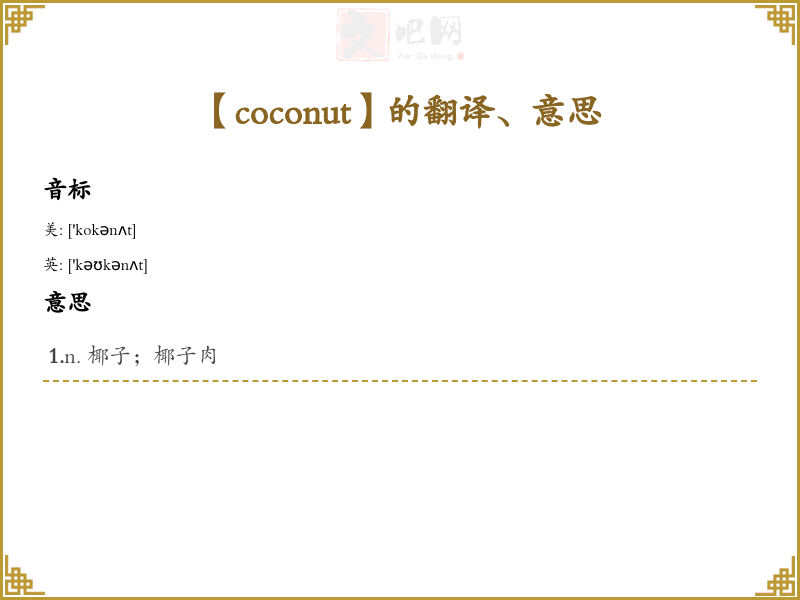【coconut】的翻译、意思
时间: 2025-01-25 23:39:13
【coconut】怎么读
美:['kokənʌt]
英:['kəʊkənʌt]
【coconut】是什么意思、字义解释
1. n. 椰子;椰子肉
【coconut】等级考试
TEM4 ( coconuts )
【coconut】的详细解释
English Word Study and Analysis: [coconut]
1. Basic Definition
- Literal Meaning: The word "coconut" refers to the large, round fruit of the coconut palm, containing white edible flesh and a clear liquid called coconut water.
- Part of Speech: Noun.
2. Etymology and Origin
-
Etymology Analysis: The word "coconut" comes from the 1*th-century Portuguese word "côco," which means "monkey face," a reference to the three holes on the coconut's shell that resemble a face. The suffix "-nut" is derived from the Old English "hnutu," meaning "nut."
-
Historical Background: The first recorded use of the word "coconut" in English was in the late 1*th century. It was introduced to Europe after the Portuguese explorers brought it from tropical regions.
-
Textbooks:
- In China, "coconut" might appear in English language textbooks for middle school or high school students, focusing on vocabulary related to food and culture.
- In Oxford and American textbooks, it might be included in early language learning materials for elementary or middle school students, often in contexts discussing fruits or tropical climates.
3. Usage Scenarios
-
Formal and Informal Contexts:
- Formal: In culinary discussions, such as "The use of coconut milk in Thai cuisine enhances the dish's creaminess and flavor" (reference: "Culinary Traditions of Southeast Asia," 2020).
- Informal: In casual conversation, one might say, "I love drinking coconut water on hot days!"
-
Special Occasions:
- In scientific contexts, such as nutrition studies, "Coconut oil is rich in medium-chain triglycerides, which can benefit health" (reference: "Journal of Nutrition," 2018).
- In art, "The coconut tree is often depicted in tropical landscape paintings" (reference: "Tropical Art and Culture," 2019).
4. Example Sentences
-
The coconut palm swayed gently in the breeze.
椰子树在微风中轻轻摇曳。 -
She made a delicious coconut cake for the party.
她为聚会做了美味的椰子蛋糕。 -
Coconut water is a popular natural beverage in many tropical countries.
椰子水是许多热带国家受欢迎的天然饮料。 -
The recipe calls for grated coconut as a topping.
这个食谱需要磨碎的椰子作为装饰。 -
Coconut oil has become a trendy ingredient in health foods.
椰子油已成为健康食品中的热门成分。
*. I found a coconut on the beach and decided to crack it open.
我在海滩上找到一个椰子,决定把它打开。
-
The tropical smoothie was refreshing, thanks to the coconut flavor.
热带冰沙因椰子味而清爽可口。 -
The festival featured a coconut-themed cooking contest.
节日活动中有一个以椰子为主题的烹饪比赛。 -
Many people enjoy coconut-based products for their health benefits.
许多人喜欢椰子基产品,因为它们的健康益处。 -
In some cultures, coconuts are used in rituals and ceremonies.
在某些文化中,椰子用于仪式和典礼。
5. Synonyms and Antonyms
- Synonyms:
- "Palm fruit" - a broader term for fruits that grow on palm trees.
- "Coco" - an informal abbreviation, primarily used in casual contexts.
- Antonyms:
- "Berry" - a different type of fruit, usually softer and smaller than a coconut.
- "Nut" (in a broader sense) - other types of nuts do not have the same characteristics as coconuts.
*. Learning Methods
- Phonetic Memory Method: Break down the word "coconut" into syllables: "co-co-nut." Associating each syllable with an image (like a coconut tree for "co," a coconut for "co," and a nut for "nut") can help retain the word in memory.
7. Associated Vocabulary
- High-Frequency Collocations:
- Coconut milk
- Coconut oil
- Coconut water
- Coconut cream
- Coconut flakes
This structured approach helps in understanding the word "coconut" from various perspectives, enhancing vocabulary acquisition and retention.
【coconut】例句
1、[N-COUNT] A coconut is a very large nut with a hairy shell, which has white flesh and milky juice inside it. 椰子
例:...the smell of roasted meats mingled with spices, coconut oil, and ripe tropical fruits.…烤肉夹杂着香料、椰子油和成熟的热带水果的味道。
2、[N-UNCOUNT] Coconut is the white flesh of a coconut. 椰子肉
例:Put 2 cups of grated coconut into a blender or food processor.把两杯碎椰子肉放进搅拌器或食品加工机内。
